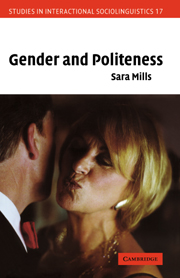4 - Theorising gender
Published online by Cambridge University Press: 13 November 2009
Summary
Introduction
In recent years the analysis of gender in feminist linguistics and in feminist theory in general has radically changed. Before going on to analyse the complex relationship between gender, politeness, and impoliteness in chapter 5, in this chapter, I discuss the theoretical and methodological problems in feminist linguistic analysis in relation to the question of ‘women's language’. I then consider feminist thinking which tries to move beyond the assumption that women's speech is always necessarily different from men's speech, and I examine the complexity of gender when analysed alongside other variables and stereotypical forms. Finally, I analyse the language of strong women speakers and gendered stereotypes to challenge further the notion that women's language is homogeneous.
Dominance or difference?
Feminist language research in the 1970s focused on the question of male dominance and female deference in conversation (Lakoff, 1975; Spender, 1980). It criticised both the social system which it viewed as patriarchal, and which it saw as forcing women to speak in a subservient way, but also individual males who were seen to violate the rights of their female interlocutors. Robin Lakoff's polemical analysis of what she considered to be female language patterns was one of the first feminist linguistic analyses which made a clear causal connection between the social and political oppression of women as a group and their linguistic behaviour. This subordinated status was displayed in the language patterns which she describes as ‘talking like a lady’ (Lakoff, 1975: 10).
- Type
- Chapter
- Information
- Gender and Politeness , pp. 164 - 201Publisher: Cambridge University PressPrint publication year: 2003



